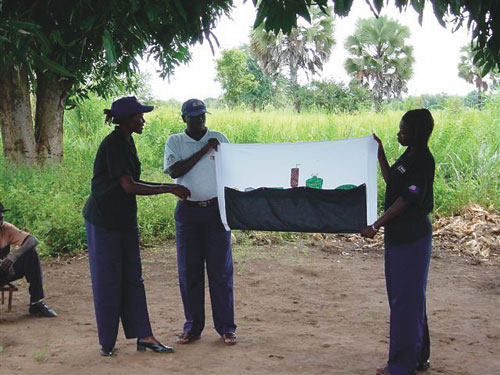Japan's Official Development Assistance White Paper 2005
Main Text > Part II ODA DISBURSEMENTS IN FISCAL YEAR 2004 > Chapter 2 Details and New Policies about Japan's ODA: Striving for Further ODA Reforms > Section 2. Measures for Each of the Priority Issues > 4. Peace-building > (3) Sudan
(3) Sudan
In January 2005, the North-South Comprehensive Peace Agreement was signed between the Government of Sudan and the Sudan People's Liberation Movement/Army ( SPLM/A ) in Nairobi, Kenya. This is a landmark agreement that concludes the civil war in Sudan that lasted over 20 years, one of the longest in the history of Africa.
This comprehensive peace agreement stipulates as follows: a national unity government will be established during the six-month interim period; a president will be selected; general elections and other processes will be held during the six-year transitional period; and finally, the Sudanese people will decide on the future of the southern part of the country through a referendum that asks whether the South should become independent or continue to be unified with the North as one country.

Training to avoid land mines buried during civil war (Photo: UNMAS)
In April 2005, with the conclusion of the North-South Comprehensive Peace Agreement in Sudan, the Donor's Conference on Sudan was held in Oslo to gain wide global support for steady implementation of the agreement. This conference was attended by UN Secretary-General Annan and over 60 countries, regions, and organizations, including Japan. At the conference, in response to a request for assistance of approximately US$4.1 billion 43 to be provided over three years from 2005 to 2007, the representatives offered a total of US$4.5 billion, surpassing the requested amount. As such, the goal of enhancing unified support of the international community for the execution of the peace agreement in Sudan has been achieved. Senior Vice-Minister Aisawa, who attended the conference as a representative of the Japanese government, announced that Japan would extend US$100 million for the short term to assist in the consolidation of peace in Sudan.
Specifically, Japan will assist projects mainly based on the United Nations 2005 Work Plan for Sudan, such as mine clearance and return and reintegration of the refugees and the internally displaced. Moreover, it will assist the UN project for DDR, offer new technical cooperation for human resources development, and continue and enhance assistance in areas that are essential for human security, such as water and sanitation, health and medical care, and food supply. In March 2005, as part of its assistance for landmine removal, Japan decided upon and provided approximately US$7 million in emergency grant aid to support the mine removal efforts including the activities in the southern region by the United Nations Mine Action Service ( UNMAS ). Furthermore, following the ODA seminar that was held in Japan in late May, governmental survey missions were dispatched to Sudan in late June to hold government-to-government talks on the implementation of bilateral assistance and to make considerations on the modalities of specific future assistance. Some such projects include assistance in the provision of food, in developing self-sufficiency in food, and in prevention of infectious diseases for children, for which Japan made a decision to offer a total of approximately ¥1.2 billion in grant aid in late July. In addition, a decision was also made to provide material aid worth approximately ¥200 million to the United Nations Mission in the Sudan (UNMIS), which was established in March as part of the UN's peacekeeping operations.
Furthermore, at the Oslo Conference, participating countries including Japan also expressed concern regarding the serious humanitarian and security crisis in Darfur. Japan called to all parties concerned for strict adherence to the UN Security Council resolution regarding the Darfur issue, and provided humanitarian assistance of approximately US$21 million in 2004. In addition, in March 2005 Japan extended approximately US$2 million to support the activities of the African Union ( AU ), which is playing a leading role in resolving the Darfur issue. Japan intends to continue to support the consolidation of peace in Sudan, while simultaneously calling to the Government of Sudan and other relevant parties for concrete efforts toward resolving the Darfur issue, keeping in step with the actions taken by the Security Council regarding the issue. (See 2 of Part II, Chapter 2, Section 4 for more information on assistance to Sudan.)
Assistance to Sudan is a typical example of assistance that Japan provides for the "consolidation of peace," which is emphasized as an important pillar in its policies for Africa. Its success could become a model case for future policies. Prime Minister Koizumi announced the overall enhancement of assistance to Africa, as well as support for peace building, at the Asia-Africa Summit held in April 2005. Assistance to Sudan is central to such efforts.


 Next Page
Next Page